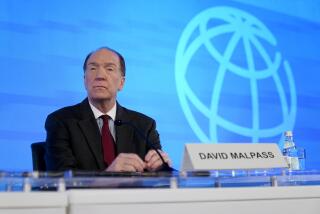Trade Group Finds a Way Out
- Share via
The unseemly process of picking a replacement for the outgoing World Trade Organization director-general, Renato Ruggiero, has been variously described as a mess and travesty. And that’s what it was until a compromise was struck to provide leadership for the next six years, with the remaining two candidates serving consecutive three-year terms. It’s not ideal, but it’s better than having no chief at all as the organization gears up for a new round of trade liberalization talks. The WTO’s ruling general council meets Thursday and should adopt the compromise.
The WTO’s 134 countries had split behind the leading candidates, Mike Moore of New Zealand and Thailand’s Supachai Panitchpakdi, with each camp using a full panoply of tricks to outdo the other. Much of Asia and the Third World lined up behind Supachai, while the United States, most of Europe, Latin America and some developing countries backed Moore.
Diplomacy yielded to acrimony, with each side accusing the other of behind-the-back dealing. The United States, which backed the wrong horse in the previous contest, four years ago, emerged badly bruised, standing accused of shady doings to undermine Supachai’s support.
The WTO, the mechanism that drives global trade liberalization and serves as the arbiter of trade disputes, could hardly afford such damage to collegial goodwill, not this close to the Seattle ministerial meeting in November, aimed at starting the next round of trade liberalization talks. Facing this impasse, WTO diplomats cobbled together a solution, having the two front-runners share the six-year term equally.
Both Moore and Supachai are widely seen as well qualified for the top job at the WTO. There is no time left to look for and build a consensus around a third candidate. Supachai has shown welcome flexibility in agreeing to have Moore serve the first three years of the term.
There are lessons to be learned from this. Most important, the United States and other leading economies should start their searches for candidates earlier. They should disclose their preferences so that a consensus can be built before the incumbent’s term nears expiration. Washington has been out front in demanding greater transparency in the WTO. It could benefit from a dose of its own medicine.
Moore should establish an informal consultation process with Supachai, informing him of decision-making at the WTO and seeking his input. Supachai should extend the same courtesy to Moore when he takes over. The split-term compromise might well set a bad precedent, but it is the best way out of this impasse.
More to Read
Inside the business of entertainment
The Wide Shot brings you news, analysis and insights on everything from streaming wars to production — and what it all means for the future.
You may occasionally receive promotional content from the Los Angeles Times.










